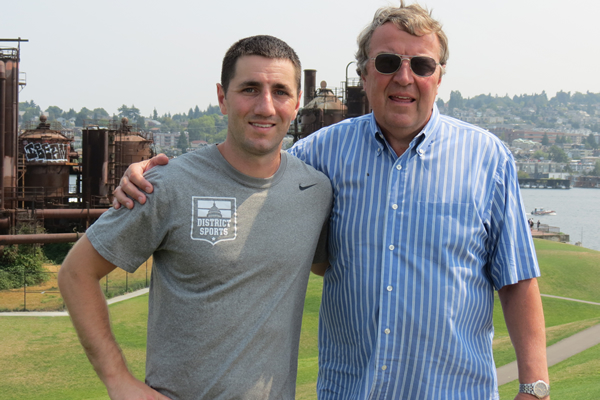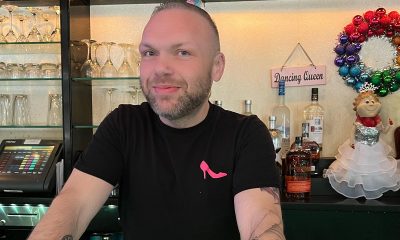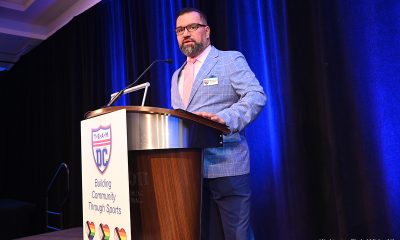Sports
Parents of gay athletes say sports brought them closer
Two local families on the powerful bond of competition
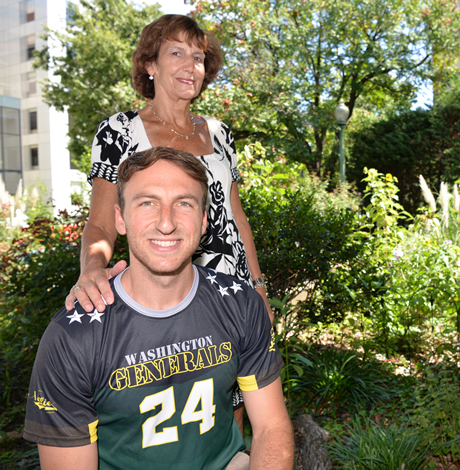
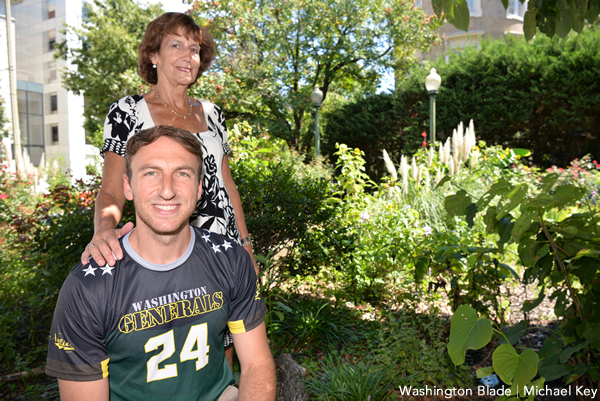
Mark and Margie Hofberg say a shared love of sports has brought them closer. (Washington Blade photo by Michael Key)
There is a family bond that occurs between parent and child when sports are a part of their everyday life. Between shuttling their children to practices, leagues, local tournaments and travel tournaments, a dynamic emerges for the parents that forms a way of life.
Sharing sports can foster a relationship that continues well into the child’s adult years. It’s a commonality that revolves around support and spending time together.
What happens when the child comes out as gay and continues to play sports? Does the dynamic change? Is it even still there?
Mark Hofberg grew up in Rockville, Md., and played multiple sports including travel-level basketball, soccer and baseball. He had a gangly phase in high school – growing one foot in a year – that relegated him to running cross country and playing frisbee and basketball recreationally while his body developed.
After coming out in his senior year of high school and growing into his 6’5” frame at the University of Maryland, Hofberg played club frisbee and any intramural sport you can think of from badminton to volleyball. He continued that through graduate school at Maryland.
Since 2012, he has been a part of the LGBT sports community in D.C. playing with the DC Gay Flag Football League, DC Pride Volleyball, Federal Triangles Soccer, DC Sentinels Basketball, Stonewall Kickball and Stonewall Dodgeball. He is in his fifth year of alternating between quarterback and captain for the Washington Generals flag football travel team.
“The LGBT sports community has given me an outlet that I need to play competitive sports,” says Hofberg. “I love it, and along with it I have found my best friends.”
Hofberg, who works in policy writing and research for an environmental nonprofit, says the person who has always been his biggest supporter is his mother, Margie Hofberg. DC Gay Flag Football is his main sport and wanting to share it with her, he asked if she would attend a game.
“She was very cautious at first, asking if I was sure she should come,” Mark Hofberg says. “Football and the league are a huge part of my life and I share everything with her. Why not share my friends?”
Margie Hofberg did indeed start coming to games and is now a regular on the sidelines along with sponsoring one of the teams through her Residential Mortgage Center. As part of her commitment as a sponsor, she runs “How to Buy a House” workshops for the players every season.
“I knew this would happen – she’s friends with more people than I am. She even goes to games when I am not there,” says Mark Hofberg, laughing. “It’s a great way for us to hang out and see each other. My dad, brother and grandfather have also been to games. I love sharing my life with my family.”
Margie Hofberg has been there all along, including coaching his youth soccer team and managing his youth baseball team.
“Whatever sport he was in, I was there supporting him and I loved every minute of it,” says Margie Hofberg. “The one thing I said when he came out to me was ‘I hope you understand you are still having my grandchildren.’”
She decided to become a sponsor of the DC Gay Flag Football League after attending Gay Bowl in Philadelphia in 2014.
“Once I saw what this community was about I wanted to become more involved and I have developed relationships beyond being Mark’s mom,” Margie Hofberg says. “Here is a group of people who are just like him and I am so glad he has an outlet to meet people. I have seen a different side of Mark emerge.”
For the Hofbergs, the sports story continues and it still revolves around support and spending time together. Margie Hofberg’s presence on the sidelines hasn’t gone unnoticed by the other players.
“I hope that seeing how Mark and I interact has helped motivate other players to start a discussion with their own family and friends,” she says. “I am so very proud of all the players in this league.”
Soccer has always been John Whitfield’s main sport and his father was a coach of his youth soccer team. When he moved on to a traveling club team, both his parents remained involved, coming to practices and games.
In his high school years in his hometown of Marysville, Wash., Whitfield played both school and club soccer and he spent two seasons playing soccer at Wartburg College. When he returned to finish his degree at Western Washington University, he continued in club and intramural soccer.
His parents had traveled to Wartburg in Iowa to see him play and the sports dynamic was still there in his collegiate years. Whitfield came out in the spring of his senior year at Western Washington.
“Soccer was always a part to focus on to separate myself from being gay. I used soccer as an excuse not to date,” says John Whitfield. “At my college graduation party, I did it all at once – came out to friends and family. I talked to a lot of people about it that day.”
He landed a job with Microsoft where he consults with the Department of Veterans Affairs, and right out of college they moved him to D.C. where Whitfield joined the Federal Triangles Soccer Club.
“My first team was very social and I stopped being afraid that playing with a gay soccer team was a gay thing,” John Whitfield says. “My two lives were finally merged together.”
Whitfield told his parents about the Federal Triangles and says they were intrigued and pleased that he was playing and meeting people. On their visits to D.C., both Debbie and Don Whitfield have attended their son’s soccer matches.
Whitfield has traveled with his team to the Gay Games and a tournament in New York. In 2016, he traveled with the Federal Triangles to the International Gay and Lesbian Football Association World Championships in Portland.
Sitting in the stands were his parents, his partner Hank, and his sister and her boyfriend. They had driven more than four hours to watch John compete. The final was played in the Portland Timbers Stadium and the Federal Triangles went on to win the world title.
“They have always been there to support me,” says John Whitfield. “Having them there to watch me play in that (MLS) stadium with my team was incredible.”
John Whitfield has two older sisters who also played soccer and their father Don was involved early on, recognizing the value in sports.
“Participating in athletics is a good learning experience for life in general,” says Don Whitfield. “When I was coaching them, it was also a good family experience. It has always been just a joy to watch my kids play.”
John advanced to the premier league at age 11 and the family experiences continued going from state to state for regional tournaments. Watching his son play continued during John’s college years.
Don Whitfield says he didn’t know that there were gay sports communities but that he is glad that they exist.
“I had seen him play in some big stadiums before Portland but it was very fun to watch him there playing at a competitive level. He is such a tough player,” Don Whitfield says. “I also enjoyed hanging out with his team afterwards when we went out for beers.”
The Whitfield family sports story remains strong and despite living on separate coasts, they continue to see each other on a regular basis.
“Before he came out, I could never put my finger on the tension because I didn’t have the tools to figure it out. Our relationship has improved dramatically because the fear is gone,” says Don Whitfield. “John is much more relaxed and my wife and I will always continue to be supportive.”

More than a dozen LGBTQ athletes won medals at the Milan Cortina Winter Olympics that ended on Sunday.
Cayla Barnes, Hilary Knight, and Alex Carpenter are LGBTQ members of the U.S. women’s hockey team that won a gold medal after they defeated Canada in overtime. Knight the day before the Feb. 19 match proposed to her girlfriend, Brittany Bowe, an Olympic speed skater.
French ice dancer Guillaume Cizeron, who is gay, and his partner Laurence Fournier Beaudry won gold. American alpine skier Breezy Johnson, who is bisexual, won gold in the women’s downhill. Amber Glenn, who identifies as bisexual and pansexual, was part of the American figure skating team that won gold in the team event.
Swiss freestyle skier Mathilde Gremaud, who is in a relationship with Vali Höll, an Austrian mountain biker, won gold in women’s freeski slopestyle.
Bruce Mouat, who is the captain of the British curling team that won a silver medal, is gay. Six members of the Canadian women’s hockey team — Emily Clark, Erin Ambrose, Emerance Maschmeyer, Brianne Jenner, Laura Stacey, and Marie-Philip Poulin — that won silver are LGBTQ.
Swedish freestyle skier Sandra Naeslund, who is a lesbian, won a bronze medal in ski cross.
Belgian speed skater Tineke den Dulk, who is bisexual, was part of her country’s mixed 2000-meter relay that won bronze. Canadian ice dancer Paul Poirier, who is gay, and his partner, Piper Gilles, won bronze.
Laura Zimmermann, who is queer, is a member of the Swiss women’s hockey team that won bronze when they defeated Sweden.
Outsports.com notes all of the LGBTQ Olympians who competed at the games and who medaled.
Sports
US wins Olympic gold medal in women’s hockey
Team captain Hilary Knight proposed to girlfriend on Wednesday

The U.S. women’s hockey team on Thursday won a gold medal at the Milan Cortina Winter Olympics.
Team USA defeated Canada 2-1 in overtime. The game took place a day after Team USA captain Hilary Knight proposed to her girlfriend, Brittany Bowe, an Olympic speed skater.
Cayla Barnes and Alex Carpenter — Knight’s teammates — are also LGBTQ. They are among the more than 40 openly LGBTQ athletes who are competing in the games.
The Olympics will end on Sunday.
Sports
Attitude! French ice dancers nail ‘Vogue’ routine
Cizeron and Fournier Beaudry strike a pose in memorable Olympics performance

Madonna’s presence is being felt at the Olympic Games in Italy.
Guillaume Cizeron and his rhythm ice dancing partner Laurence Fournier Beaudry of France performed a flawless skate to Madonna’s “Vogue” and “Rescue Me” on Monday.
The duo scored an impressive 90.18 for their effort, the best score of the night.
“We’ve been working hard the whole season to get over 90, so it was nice to see the score on the screen,” Fournier Beaudry told Olympics.com. “But first of all, just coming out off the ice, we were very happy about what we delivered and the pleasure we had out there. With the energy of the crowd, it was really amazing.”
Watch the routine on YouTube here.

